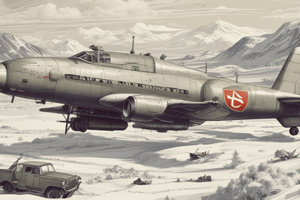Podcast
Questions and Answers
What major events marked the Cold War era between the Soviet Union and the United States?
What major events marked the Cold War era between the Soviet Union and the United States?
- World War I and World War II
- Space Race and nuclear arms race (correct)
- Vietnam War and Korean War
- American Civil War and French Revolution
What were some positive changes brought about by the Soviet Union's legacy?
What were some positive changes brought about by the Soviet Union's legacy?
- Political repression and economic stagnation
- Nationalism and ethnic conflicts
- Improved education and women's rights (correct)
- Religious identities in Eastern Europe
What factors contributed to the eventual collapse of the Soviet Union in 1991?
What factors contributed to the eventual collapse of the Soviet Union in 1991?
- Increased cooperation with Western powers
- Internal political, economic, and social problems (correct)
- External military pressure and technological advancements
- Environmental activism and social media influence
How did the collapse of the Soviet Union impact the contemporary political landscape?
How did the collapse of the Soviet Union impact the contemporary political landscape?
Which of the following is NOT a debated or discussed global idea from the Soviet Union's legacy?
Which of the following is NOT a debated or discussed global idea from the Soviet Union's legacy?
What are some aspects that studying the history of the Soviet Union can help develop in individuals?
What are some aspects that studying the history of the Soviet Union can help develop in individuals?
Who was the founder of the Soviet Union?
Who was the founder of the Soviet Union?
Which event led to the disintegration of the Russian Empire and the formation of the Soviet Union?
Which event led to the disintegration of the Russian Empire and the formation of the Soviet Union?
Under which ideology did the Soviet Union operate?
Under which ideology did the Soviet Union operate?
Who transformed the Soviet Union into a centralized, one-party state?
Who transformed the Soviet Union into a centralized, one-party state?
Which major event significantly strengthened the Soviet Union's position on the world stage?
Which major event significantly strengthened the Soviet Union's position on the world stage?
What were some consequences of Joseph Stalin's policies of industrialization and collectivization?
What were some consequences of Joseph Stalin's policies of industrialization and collectivization?
Flashcards are hidden until you start studying
Study Notes
Soviet Union in Class 10: A Brief Overview
The Soviet Union, a predecessor to modern-day Russia, is a significant episode in human history that demands attention in Class 10 studies for its lasting impact on the world. As we delve into this topic, we'll focus on the historical context and major events you should know.
Origins and Ideology
The Soviet Union, formed in 1922, was the successor of the Russian Empire, which disintegrated after the 1917 Bolshevik Revolution. Led by Vladimir Lenin and later Joseph Stalin, the Soviet Union followed a communist ideology that aimed to create classless, stateless societies based on common ownership of the means of production.
Key Leaders and Their Impact
- Vladimir Lenin (1922–1924) was the founder of the Soviet Union and instrumental in the 1917 Revolution. He established the first communist regime in the world and set the groundwork for the Soviet system.
- Joseph Stalin (1924–1953) consolidated his power and transformed the Soviet Union into a centralized, one-party state. Notably, his policies of industrialization and collectivization led to economic growth but also to millions of deaths due to famine and forced labor.
Major Events and Consequences
- World War II: The Soviet Union fought against Nazi Germany, resulting in over 26 million Soviet deaths and the liberation of Eastern Europe. The Soviet Union's role in World War II significantly strengthened its position on the world stage.
- The Cold War: The Soviet Union and the United States faced each other in a political and military standoff from 1947 to 1991. The Space Race between the two superpowers and the nuclear arms race marked the Cold War era. The Soviet Union's eventual collapse in 1991 was the result of internal political, economic, and social problems.
Legacy and Enduring Impact
The Soviet Union's legacy is complex and multifaceted. On one hand, it brought about many positive changes, including social welfare programs, improved education, and women's rights. However, it also resulted in political repression, economic stagnation, and environmental degradation.
The Soviet Union's enduring impact is evident in the contemporary political landscape. Its collapse paved the way for the rise of nationalism, ethnic conflicts, and the resurgence of religious identities in Eastern Europe and Central Asia. Additionally, many of its ideas, such as the importance of state-led economic development and the desire for political equality, continue to be debated and discussed globally.
In conclusion, the Soviet Union offers an intriguing chapter in history that will help develop your critical thinking skills, broaden your perspective, and deepen your understanding of the world we live in. So, as you study this topic, remember to be open-minded, curious, and always seek to learn more.
Studying That Suits You
Use AI to generate personalized quizzes and flashcards to suit your learning preferences.



